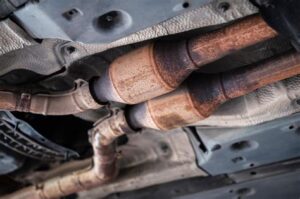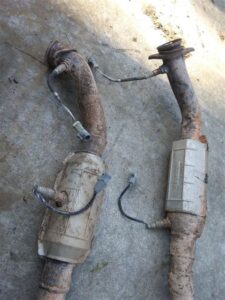Are you experiencing performance issues with your 2007 Nissan Altima? The catalytic converter plays a crucial role in your vehicle’s emissions control and overall functionality. In this article, we’ll delve into the importance of the catalytic converter, specifically for the 2007 Nissan Altima, and provide insights on common problems that may arise. You’ll learn how to diagnose issues, the steps necessary for a successful replacement, and tips on enhancing your vehicle’s performance post-replacement. By understanding the pivotal role this component plays in your car, you can ensure optimal performance and longevity for your Altima, keeping it running smoothly on the road for years to come.
Understanding The Function Of The 2007 Nissan Altima Catalytic Converter
The catalytic converter in your 2007 nissan Altima plays a crucial role in reducing harmful emissions produced by the engine. It serves as a vital component of the vehicle’s exhaust system, converting harmful pollutants into less harmful emissions before they exit the vehicle. Here’s how it works:
| Process | Description |
|---|---|
| Reduction Reaction | The catalytic converter initiates a chemical reaction that reduces nitrogen oxides (NOx) into nitrogen (N2) and oxygen (O2). |
| Oxidation Reaction | Carbon monoxide (CO) and unburned hydrocarbons (HC) undergo oxidation, converting them into carbon dioxide (CO2) and water (H2O). |
By effectively facilitating these reactions, the catalytic converter helps to meet environmental regulations and maintain vehicle efficiency. Without a functioning 2007 nissan Altima catalytic converter, emissions can rise significantly, leading to potential failures during emissions testing and increased environmental impact.
The catalytic converter is essential for ensuring that your 2007 nissan Altima runs cleanly and efficiently, making its maintenance a priority for every vehicle owner.
Common Issues With The 2007 Nissan Altima Catalytic Converter
The 2007 Nissan Altima’s catalytic converter plays a critical role in reducing harmful emissions. However, like all vehicle components, it can encounter several common issues that may affect its performance and functionality. Here are some of the prevalent problems associated with the catalytic converter in the 2007 Nissan Altima:
- Clogging: One of the most frequent issues is clogging due to the buildup of carbon, dirt, and other contaminants. This can lead to decreased engine performance and increased exhaust backpressure.
- Failure to Start: A malfunctioning catalytic converter can cause the vehicle to experience starting problems, as the engine may struggle to expel exhaust gases.
- P0680 Error Code: This code indicates a problem with your vehicle’s PCM (Powertrain Control Module), often linked to issues with the catalytic converter.
- Overheating: Excessive heat can damage the catalytic converter’s internal components, affecting overall performance and potentially causing further issues.
- Rattling Noise: If you hear a rattling sound coming from the exhaust, it might indicate that the catalyst elements within the converter are damaged and have come loose.
- Strong Smell: A sulfur-like smell or excessive exhaust fumes can signify that the catalytic converter is failing, allowing unburned fuel to escape.
- Decreased Fuel Efficiency: Drivers may notice a drop in fuel economy, often linked to issues with the catalytic converter, which hinders optimal engine function.
Addressing these issues promptly is crucial to maintaining the efficiency and longevity of your 2007 Nissan Altima’s catalytic converter, preventing further damage to the exhaust system and engine performance.
How To Diagnose Problems In Your 2007 Nissan Altima Catalytic Converter
Diagnosing issues with the catalytic converter in your 2007 Nissan Altima can help prevent further damage and ensure optimal vehicle performance. Here are the steps you should follow:
| Step | Action |
|---|---|
| 1 | Visual Inspection |
| 2 | Check for Warning Lights |
| 3 | Listen for Unusual Noises |
| 4 | Perform Exhaust Gas Test |
| 5 | Check Engine Performance |
1. Visual Inspection: Start by examining the catalytic converter for any visible signs of damage, such as dents, rust, or leaks. Ensure that all exhaust connections are secure.
2. Check for Warning Lights: Look at your dashboard for the check engine light. If it is illuminated, use an OBD-II scanner to retrieve any error codes related to the engine or catalytic converter.
3. Listen for Unusual Noises: While the engine is running, listen for rattling noises. A loose or damaged catalytic converter may produce such sounds, indicating that it needs inspection or replacement.
4. Perform Exhaust Gas Test: Conduct an exhaust gas test to evaluate the effectiveness of the catalytic converter. This test measures the levels of pollutants in the exhaust and helps determine if the converter is functioning properly.
5. Check Engine Performance: Pay attention to the vehicle’s performance. If you experience sluggish acceleration, reduced fuel efficiency, or bad smells from the exhaust, these may be signs that the catalytic converter is failing.
By following these steps, you can effectively diagnose problems with the catalytic converter in your 2007 Nissan Altima, ensuring your vehicle runs smoothly and efficiently.
Steps To Replace The 2007 Nissan Altima Catalytic Converter Effectively
Replacing the catalytic converter on your 2007 Nissan Altima can seem daunting, but with the right tools and guidance, it can be done effectively. Here are the steps to follow:
- Gather the Necessary Tools and Materials: Before starting, ensure you have the required tools such as a socket set, wrenches, screwdrivers, and a new catalytic converter. Additionally, having a jack and jack stands is essential for lifting the vehicle safely.
- Prepare the Vehicle: Park your 2007 Nissan Altima on a flat, stable surface. Engage the parking brake and, if necessary, disconnect the battery to ensure safety while working on the exhaust system.
- Lift the Vehicle: Use a jack to lift the front of the car, securing it with jack stands to avoid any risk of the vehicle falling while you work underneath.
- Remove the Old Catalytic Converter: Locate the catalytic converter beneath the vehicle. Using the appropriate tools, loosen and remove the bolts that secure it to the exhaust system. You may also need to disconnect any oxygen sensors attached to the converter.
- Inspect the Exhaust System: Before installing the new catalytic converter, take a moment to inspect the surrounding exhaust components for any signs of damage or excessive wear. Address any issues found to ensure optimal performance.
- Install the New Catalytic Converter: Position the new catalytic converter in place and secure it using the previously removed bolts. Ensure all gaskets or seals are properly in place to prevent any exhaust leaks.
- Reconnect Oxygen Sensors: If your new catalytic converter has provisions for oxygen sensors, reconnect them to ensure your vehicle’s engine management system functions correctly.
- Lower the Vehicle: Once the new catalytic converter is securely installed, carefully remove the jack stands and lower the vehicle back to the ground.
- Reconnect the Battery: If you disconnected the battery earlier, reconnect it now and ensure all connections are secure.
- Perform a Test Drive: After completion, take your 2007 Nissan Altima for a test drive. Monitor its performance and listen for any unusual sounds that might indicate an issue with the installation.
Following these steps will help ensure a successful replacement of the catalytic converter, ultimately improving the performance of your 2007 Nissan Altima.
Enhancing Performance After Replacing The 2007 Nissan Altima Catalytic Converter
After successfully replacing the catalytic converter in your 2007 Nissan Altima, there are several steps you can take to ensure that your vehicle performs optimally. Here are some effective strategies to enhance your car’s performance:
By implementing these enhancements, you can enjoy improved performance from your 2007 Nissan Altima, ensuring that it runs more efficiently and effectively on the road.
Frequently Asked Questions
What is a catalytic converter and why is it important for the 2007 Nissan Altima?
A catalytic converter is an essential component of a vehicle’s exhaust system. It helps reduce harmful emissions by converting toxic gases produced during combustion into less harmful substances. For the 2007 Nissan Altima, it ensures the vehicle meets emission standards while improving overall performance.
What are common signs of a failing catalytic converter in the 2007 Nissan Altima?
Common signs include a drop in engine performance, decreased fuel efficiency, unusual exhaust odors, and the check engine light being illuminated. In some cases, you may also hear rattling noises from under the vehicle, indicating a damaged converter.
How much does it typically cost to replace the catalytic converter on a 2007 Nissan Altima?
The cost of replacing a catalytic converter can vary widely based on location and whether you choose an OEM or aftermarket part. Generally, it can range from $1,000 to $3,000, including parts and labor.
Can I drive my 2007 Nissan Altima if the catalytic converter is damaged?
While it’s technically possible to drive with a damaged catalytic converter, it’s not advisable. Doing so can lead to further engine damage, increased emissions, and failing emissions tests, resulting in fines or penalties.
Are there any DIY solutions for issues with the catalytic converter in the 2007 Nissan Altima?
While it’s always best to consult a professional for catalytic converter issues, basic maintenance like ensuring the exhaust system is not clogged, checking for leaks, and monitoring engine codes can help. However, significant repairs should be left to professionals.
What could cause a catalytic converter to fail in a 2007 Nissan Altima?
Catalytic converter failure can result from several factors, including engine misfires, oil or coolant leaks into the engine, and prolonged usage of low-quality fuel. Regular maintenance can help prevent these issues.
Can a faulty catalytic converter affect the performance of my 2007 Nissan Altima?
Yes, a faulty catalytic converter can significantly impact engine performance. It can cause reduced power output, rough idling, and increased fuel consumption, leading to an overall decrease in driving experience.





